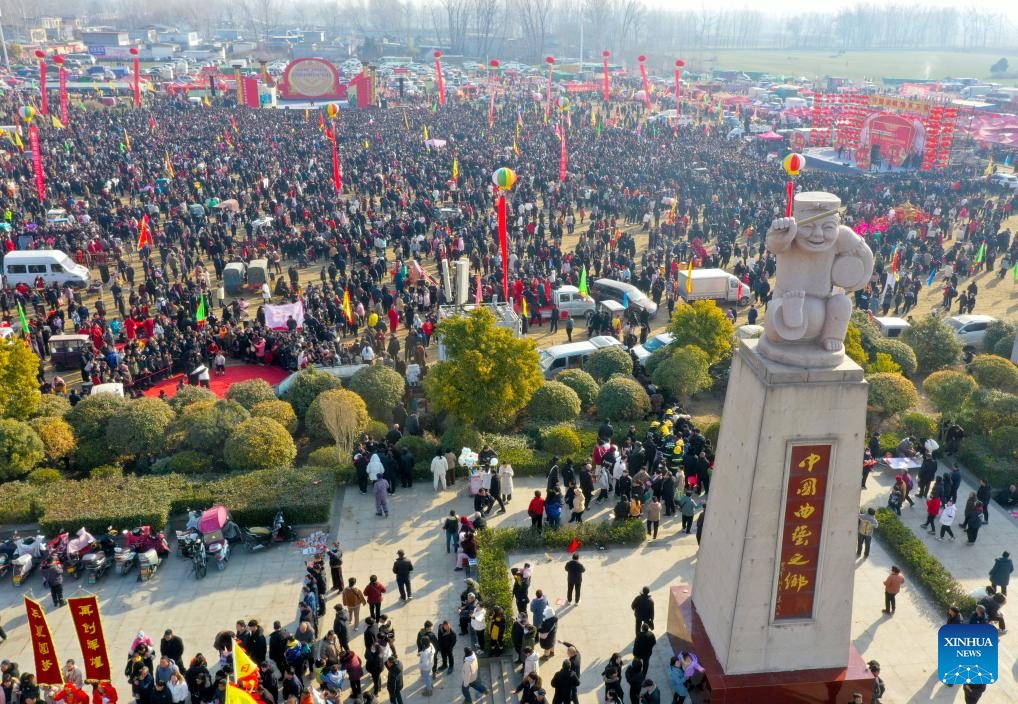
An aerial drone photo shows a view at the Majie Quyi Fair in Majie Village of Baofeng County, central China's Henan Province, Feb. 10, 2025. On Monday, the 13th day of the first month on Chinese traditional calendar, a grand feast of Quyi unfolded in the wheat fields of Majie Village.
Quyi, meaning Chinese folk arts, refers to various narrative and singing forms including ballad singing, comic dialogues, clapper talk and crosstalk, which remain popular among the Chinese people.
The Majie Quyi Fair, with a history of over 700 years, was inscribed on the first national intangible cultural heritage list in 2006. (Xinhua/Hao Yuan)
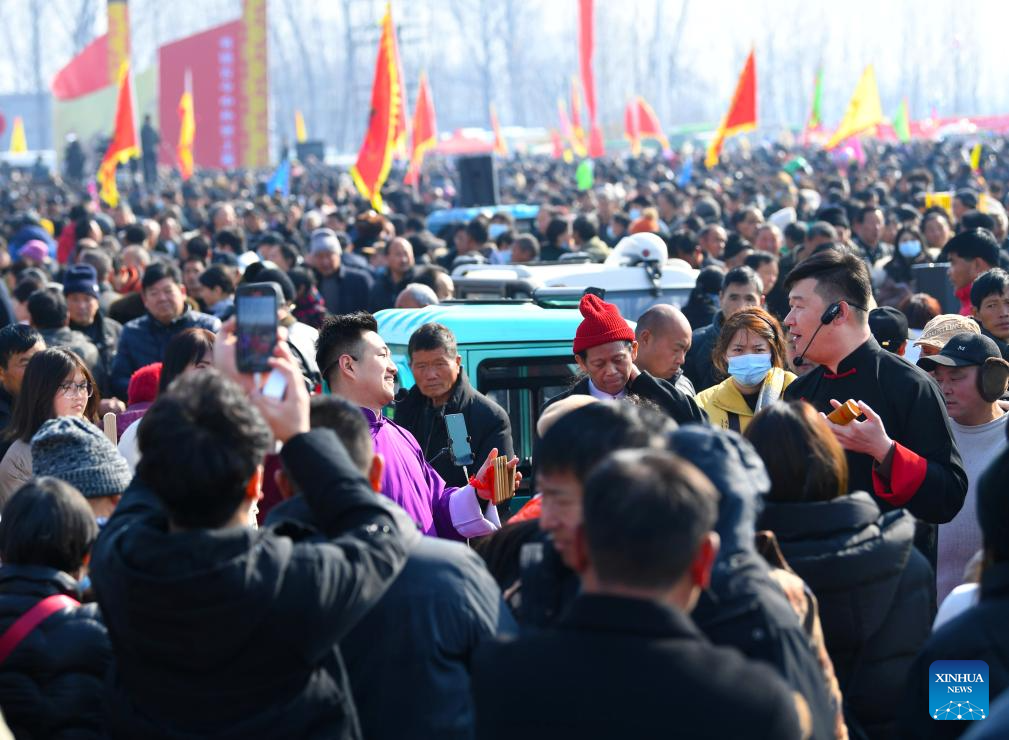
This photo shows a view at the Majie Quyi Fair in Majie Village of Baofeng County, central China's Henan Province, Feb. 10, 2025. On Monday, the 13th day of the first month on Chinese traditional calendar, a grand feast of Quyi unfolded in the wheat fields of Majie Village.
Quyi, meaning Chinese folk arts, refers to various narrative and singing forms including ballad singing, comic dialogues, clapper talk and crosstalk, which remain popular among the Chinese people.
The Majie Quyi Fair, with a history of over 700 years, was inscribed on the first national intangible cultural heritage list in 2006. (Xinhua/Hao Yuan)
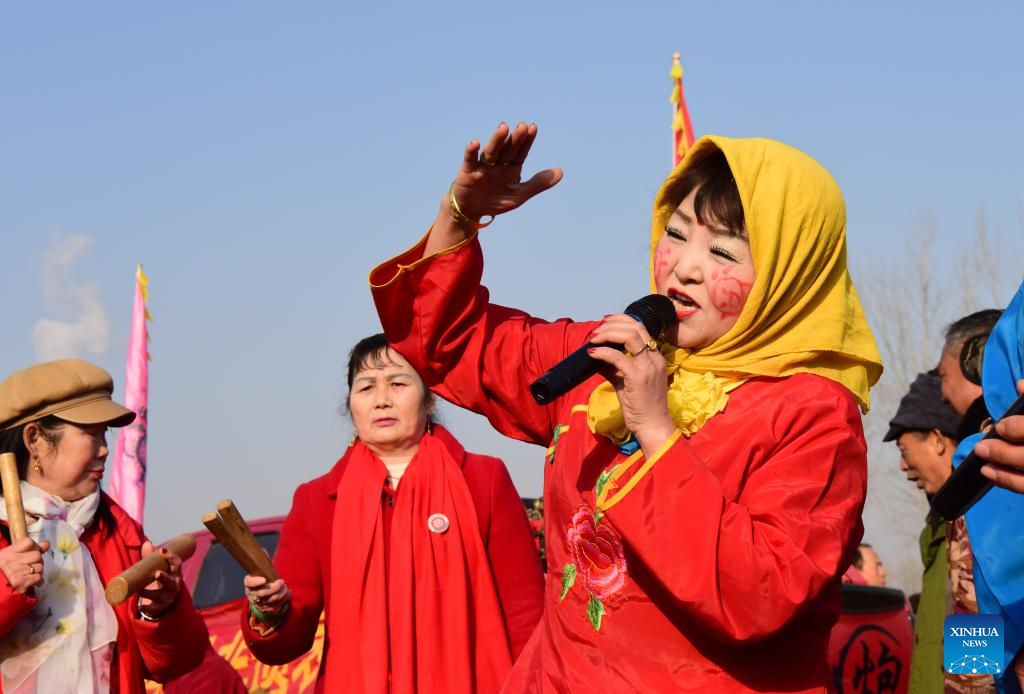
Folk artists perform during the Majie Quyi Fair in Majie Village of Baofeng County, central China's Henan Province, Feb. 10, 2025. On Monday, the 13th day of the first month on Chinese traditional calendar, a grand feast of Quyi unfolded in the wheat fields of Majie Village.
Quyi, meaning Chinese folk arts, refers to various narrative and singing forms including ballad singing, comic dialogues, clapper talk and crosstalk, which remain popular among the Chinese people.
The Majie Quyi Fair, with a history of over 700 years, was inscribed on the first national intangible cultural heritage list in 2006. (Xinhua/Zhu Xiang)
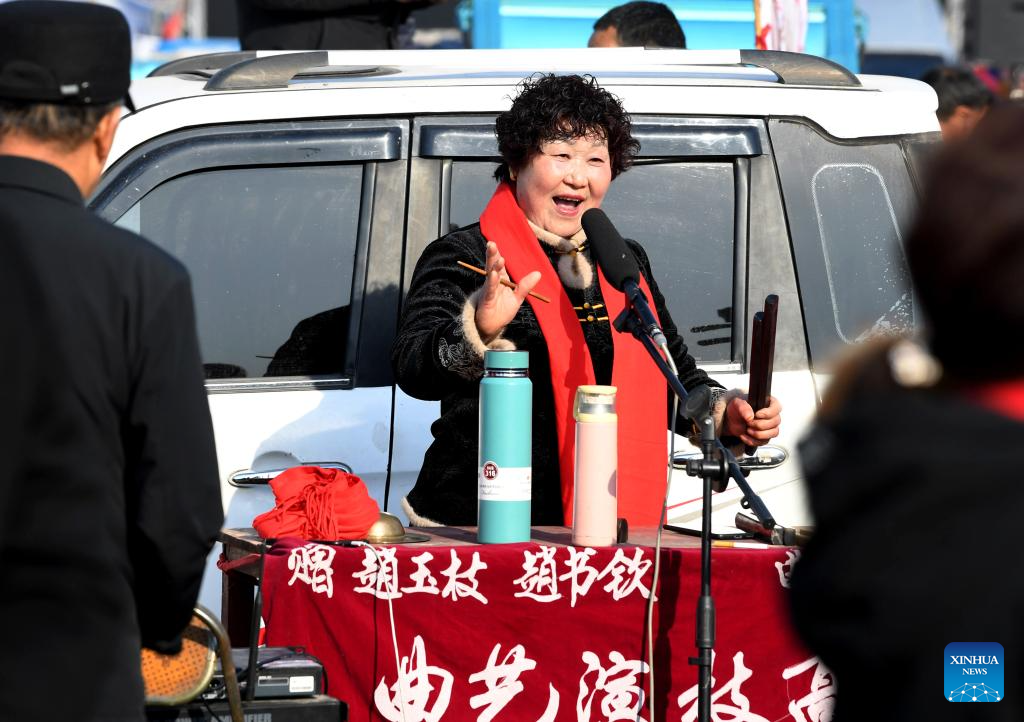
A folk artist performs during the Majie Quyi Fair in Majie Village of Baofeng County, central China's Henan Province, Feb. 10, 2025. On Monday, the 13th day of the first month on Chinese traditional calendar, a grand feast of Quyi unfolded in the wheat fields of Majie Village.
Quyi, meaning Chinese folk arts, refers to various narrative and singing forms including ballad singing, comic dialogues, clapper talk and crosstalk, which remain popular among the Chinese people.
The Majie Quyi Fair, with a history of over 700 years, was inscribed on the first national intangible cultural heritage list in 2006. (Xinhua/Hao Yuan)
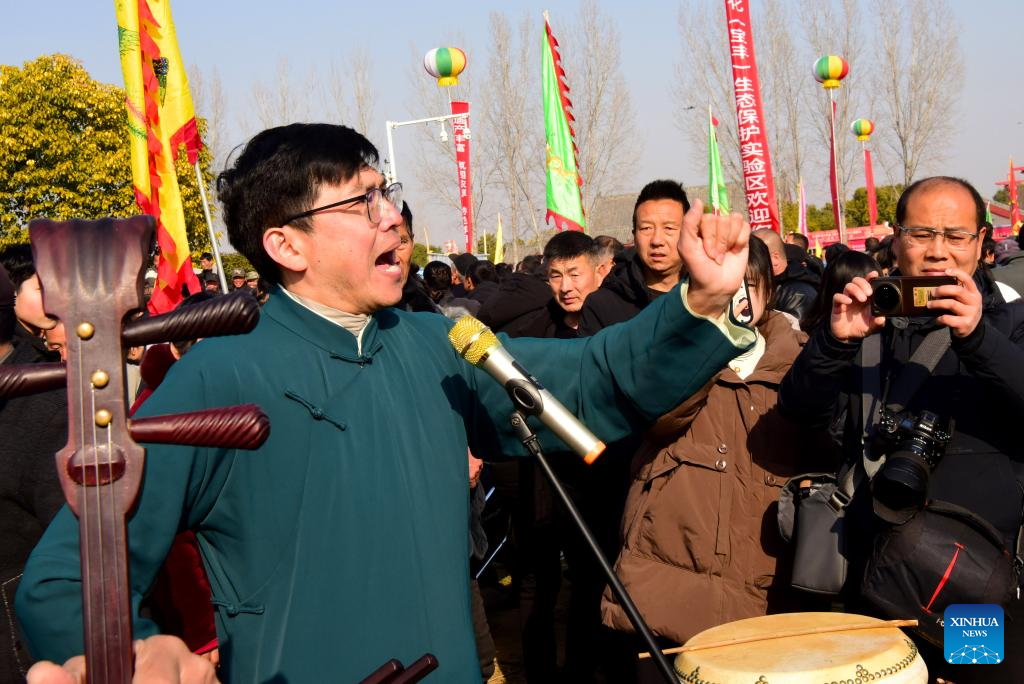
A folk artist performs during the Majie Quyi Fair in Majie Village of Baofeng County, central China's Henan Province, Feb. 10, 2025. On Monday, the 13th day of the first month on Chinese traditional calendar, a grand feast of Quyi unfolded in the wheat fields of Majie Village.
Quyi, meaning Chinese folk arts, refers to various narrative and singing forms including ballad singing, comic dialogues, clapper talk and crosstalk, which remain popular among the Chinese people.
The Majie Quyi Fair, with a history of over 700 years, was inscribed on the first national intangible cultural heritage list in 2006. (Xinhua/Zhu Xiang)
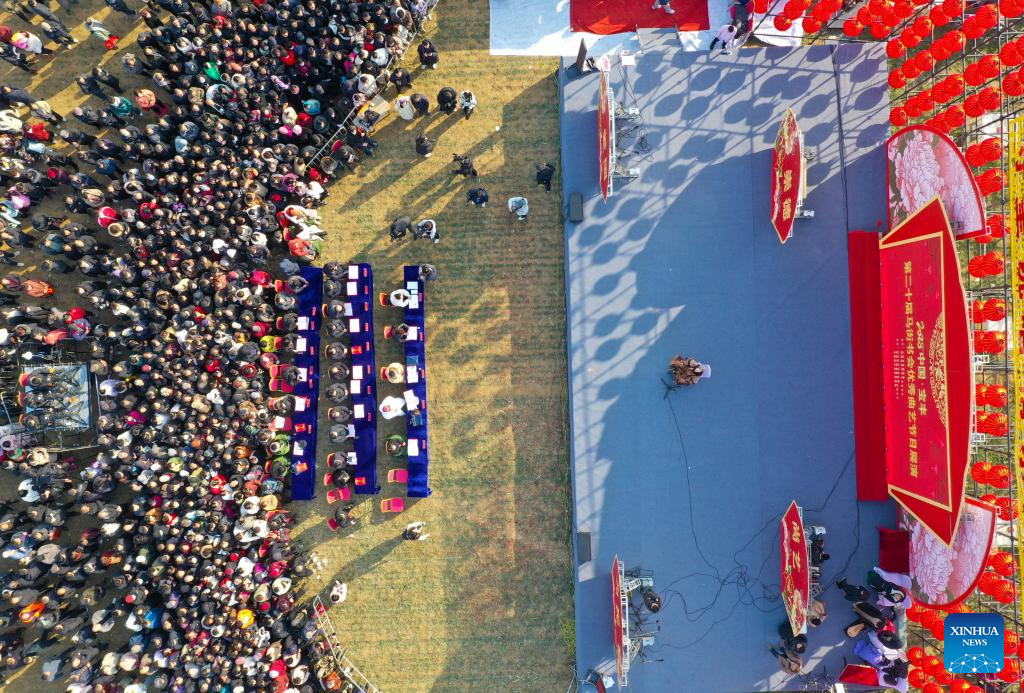
An aerial drone photo shows a view at the Majie Quyi Fair in Majie Village of Baofeng County, central China's Henan Province, Feb. 10, 2025. On Monday, the 13th day of the first month on Chinese traditional calendar, a grand feast of Quyi unfolded in the wheat fields of Majie Village.
Quyi, meaning Chinese folk arts, refers to various narrative and singing forms including ballad singing, comic dialogues, clapper talk and crosstalk, which remain popular among the Chinese people.
The Majie Quyi Fair, with a history of over 700 years, was inscribed on the first national intangible cultural heritage list in 2006. (Xinhua/Hao Yuan)
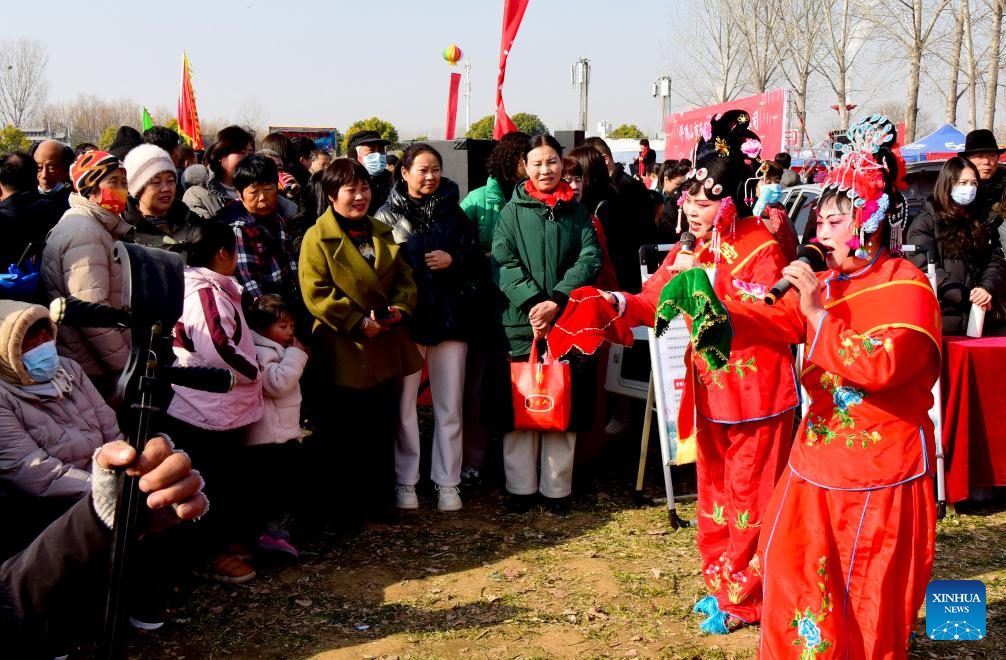
Folk artists perform during the Majie Quyi Fair in Majie Village of Baofeng County, central China's Henan Province, Feb. 10, 2025. On Monday, the 13th day of the first month on Chinese traditional calendar, a grand feast of Quyi unfolded in the wheat fields of Majie Village.
Quyi, meaning Chinese folk arts, refers to various narrative and singing forms including ballad singing, comic dialogues, clapper talk and crosstalk, which remain popular among the Chinese people.
The Majie Quyi Fair, with a history of over 700 years, was inscribed on the first national intangible cultural heritage list in 2006. (Xinhua/Zhu Xiang)
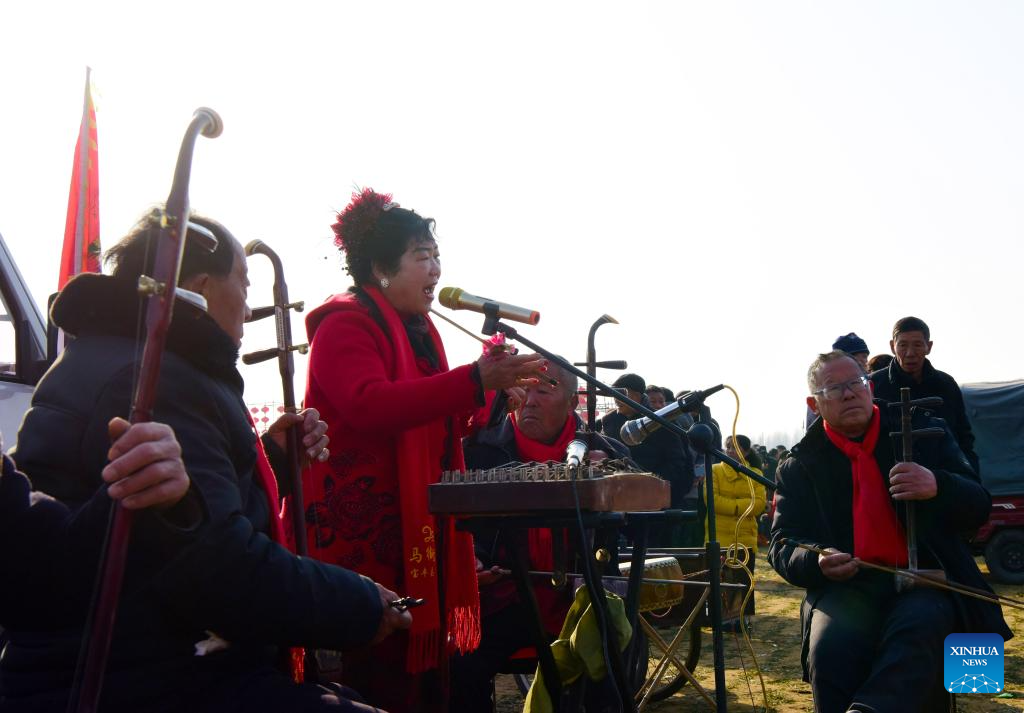
Folk artists perform during the Majie Quyi Fair in Majie Village of Baofeng County, central China's Henan Province, Feb. 10, 2025. On Monday, the 13th day of the first month on Chinese traditional calendar, a grand feast of Quyi unfolded in the wheat fields of Majie Village.
Quyi, meaning Chinese folk arts, refers to various narrative and singing forms including ballad singing, comic dialogues, clapper talk and crosstalk, which remain popular among the Chinese people.
The Majie Quyi Fair, with a history of over 700 years, was inscribed on the first national intangible cultural heritage list in 2006. (Xinhua/Zhu Xiang)
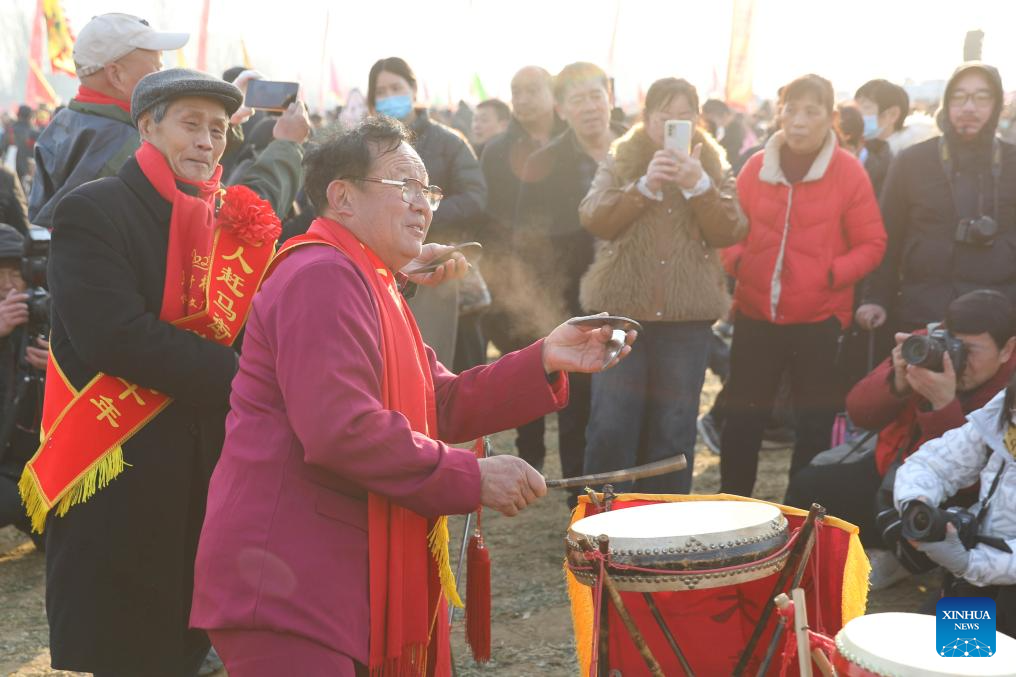
A folk artist performs during the Majie Quyi Fair in Majie Village of Baofeng County, central China's Henan Province, Feb. 10, 2025. On Monday, the 13th day of the first month on Chinese traditional calendar, a grand feast of Quyi unfolded in the wheat fields of Majie Village.
Quyi, meaning Chinese folk arts, refers to various narrative and singing forms including ballad singing, comic dialogues, clapper talk and crosstalk, which remain popular among the Chinese people.
The Majie Quyi Fair, with a history of over 700 years, was inscribed on the first national intangible cultural heritage list in 2006. (Photo by He Wuchang/Xinhua)
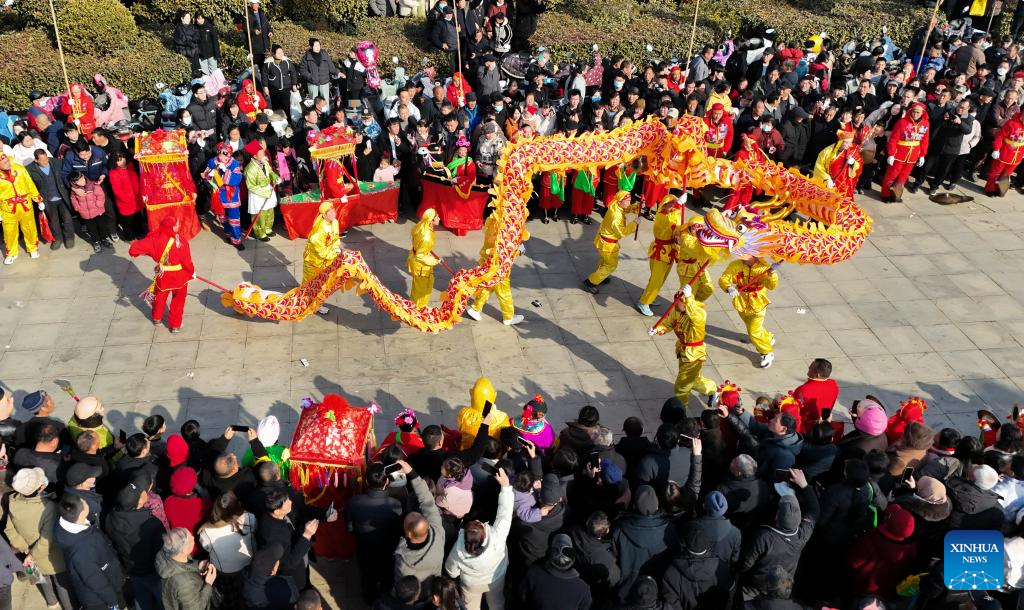
An aerial drone photo shows a view at the Majie Quyi Fair in Majie Village of Baofeng County, central China's Henan Province, Feb. 10, 2025. On Monday, the 13th day of the first month on Chinese traditional calendar, a grand feast of Quyi unfolded in the wheat fields of Majie Village.
Quyi, meaning Chinese folk arts, refers to various narrative and singing forms including ballad singing, comic dialogues, clapper talk and crosstalk, which remain popular among the Chinese people.
The Majie Quyi Fair, with a history of over 700 years, was inscribed on the first national intangible cultural heritage list in 2006. (Photo by He Wuchang/Xinhua)
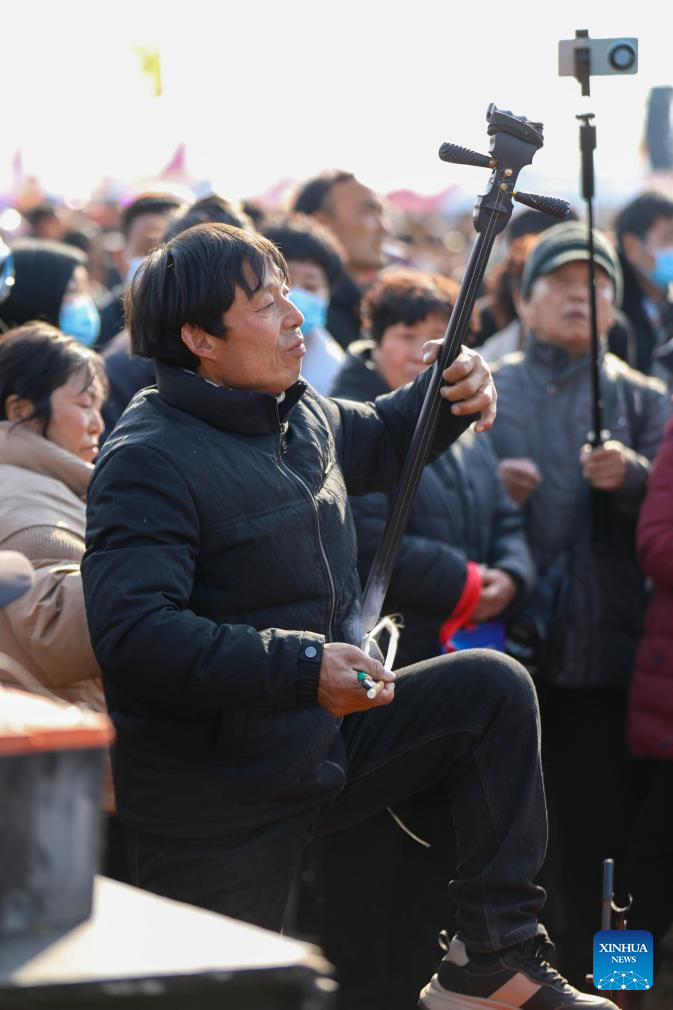
A folk artist performs during the Majie Quyi Fair in Majie Village of Baofeng County, central China's Henan Province, Feb. 10, 2025. On Monday, the 13th day of the first month on Chinese traditional calendar, a grand feast of Quyi unfolded in the wheat fields of Majie Village.
Quyi, meaning Chinese folk arts, refers to various narrative and singing forms including ballad singing, comic dialogues, clapper talk and crosstalk, which remain popular among the Chinese people.
The Majie Quyi Fair, with a history of over 700 years, was inscribed on the first national intangible cultural heritage list in 2006. (Photo by He Wuchang/Xinhua)
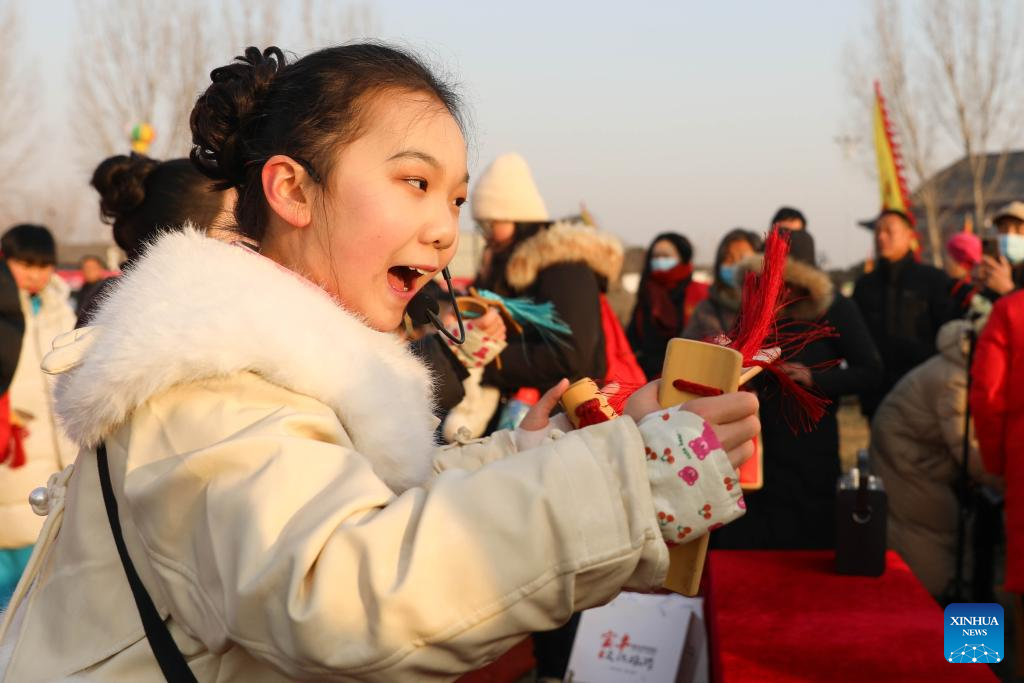
A folk artist performs during the Majie Quyi Fair in Majie Village of Baofeng County, central China's Henan Province, Feb. 10, 2025. On Monday, the 13th day of the first month on Chinese traditional calendar, a grand feast of Quyi unfolded in the wheat fields of Majie Village.
Quyi, meaning Chinese folk arts, refers to various narrative and singing forms including ballad singing, comic dialogues, clapper talk and crosstalk, which remain popular among the Chinese people.
The Majie Quyi Fair, with a history of over 700 years, was inscribed on the first national intangible cultural heritage list in 2006. (Photo by He Wuchang/Xinhua)



